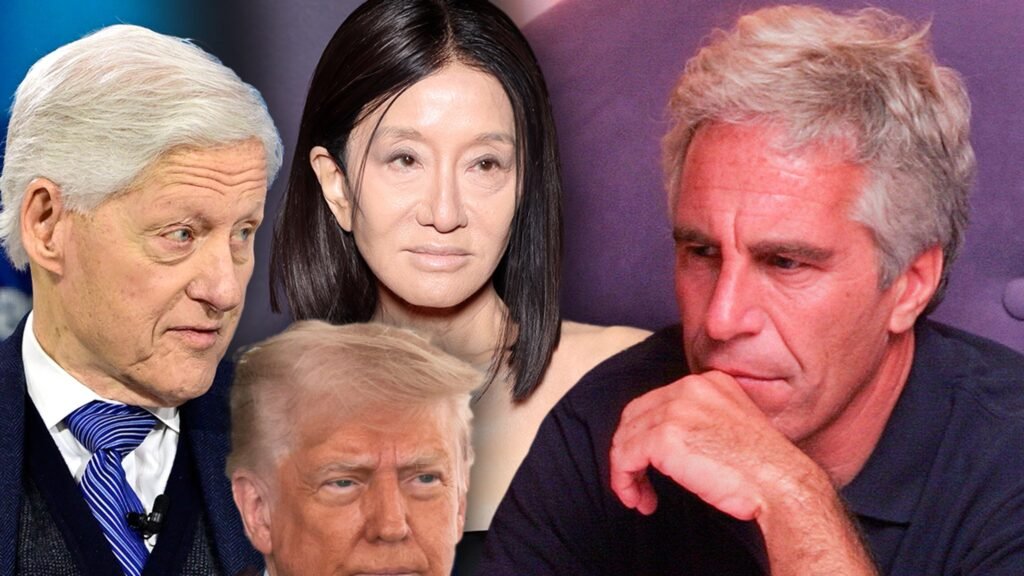Surprising Connections: Bill Clinton and Vera Wang’s Birthday Notes to Jeffrey Epstein
Recent revelations have stirred significant controversy regarding high-profile individuals and their associations with convicted sex offender Jeffrey Epstein. According to a report by The Wall Street Journal, former President Bill Clinton and renowned fashion designer Vera Wang penned heartfelt birthday messages for Epstein’s 50th, organized by his close confidante Ghislaine Maxwell. This striking connection sheds light on the tangled web of relationships surrounding Epstein, raising questions about the extent of his influence and the nature of his social circle.
The Contents of the Birthday Book
The birthday book, said to have been created in 2003, features personalized notes that offer a glimpse into the lives of those who interacted with Epstein prior to his legal troubles. Clinton’s message, noted to be in his own handwriting, reflects introspection and admiration. He reportedly expressed reassurance about longevity, friendship, and the importance of curiosity in life. The subtleties of Clinton’s note suggest a personal bond, highlighting how figures from different realms of society can find common ground.
Conversely, Vera Wang’s note takes on a more light-hearted tone, hinting at a potential shopping outing with Epstein and humorously alluding to making him "The Bachelor." This juxtaposition of the serious and the whimsical further illustrates the diverse relationships Epstein maintained. Such anecdotes not only deepen the mystery surrounding Epstein but also draw attention to how public figures navigate personal acquaintances amid scandals.
Broader Implications of Epstein’s Social Network
The involvement of public figures like Clinton and Wang paints a vivid picture of Epstein’s broad social network, which included various celebrities and political leaders. Each message contained in the birthday album provides a unique narrative that reflects the intricate fabric of their relationships with him. While some responses suggest warmth and familiarity, they also highlight a troubling disconnect concerning Epstein’s criminal activities, especially given that the compilation of notes occurred just three years before his arrest in Florida in 2006 for soliciting underage girls.
The nature of these connections invites the public to reconsider what it means to engage with controversial individuals. In a time where transparency and accountability are paramount, the understanding of one’s associations may shape public perception, raising ethical questions about how relationships can impact reputations.
The Responses and Denial from Other Figures
The report also brought to light a controversial assertion that Donald Trump contributed a note to the same birthday book, a claim Trump has publicly denied, even going so far as to sue the publication for defamation. This denial raises questions about the veracity of such connections and highlights the challenges in navigating intertwined social interactions. As notable figures grapple with their past associations with Epstein, the ramifications can ripple through their careers and public personas.
The divergent reactions from those involved—whether through acceptance or outright denial—underscore the complexities of personal relationships against a backdrop of criminality and scandal. In a digital age where information spreads rapidly, the reputations of these high-profile individuals are continually scrutinized.
The Ongoing Investigation and Cultural Impact
As investigations into Epstein’s wide-reaching network continue to unfold, the implications are far-reaching. The notes serve not only as artifacts of friendship but as potential evidence in a broader inquiry into the systemic issues surrounding sex trafficking and abuse. The societal reckoning has prompted movements like #MeToo to gain traction, placing increased pressure on public figures to be accountable for their associations and actions.
This evolving narrative shines a spotlight on the necessity for a cultural shift, advocating for transparency and justice. Individuals tied to Epstein must confront their prior relationships by promoting awareness around consent and accountability. The story of Epstein’s legacy continues to unravel, demanding a closer examination of how society views power dynamics, privilege, and responsibility.
Conclusion: A Cautionary Tale in Celebrity Culture
The birthday notes to Jeffrey Epstein by Bill Clinton and Vera Wang remind us that celebrity culture has profound implications, extending beyond glamour and fame into serious social issues. The unfolding details serve as a cautionary tale about the importance of understanding one’s associations in an interconnected world. As we dissect these complex relationships, we must remain vigilant in asking tough questions about morality, accountability, and the lasting impact of personal connections within broader societal contexts. This ongoing narrative holds the potential to reshape dialogues surrounding celebrity, influence, and justice.
In conclusion, Epstein’s legacy serves as a reminder that associations, regardless of stature, must be approached with critical awareness. Addressing the darker side of celebrity culture compels us to act in pursuit of justice, advocating for a society that protects vulnerable individuals and holds powerful figures accountable for their actions.





